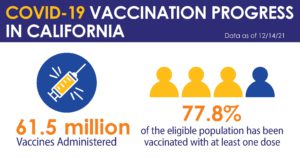One year ago today, the first doses of the Pfizer vaccine arrived in California in a historic scientific breakthrough in the ongoing COVID-19 pandemic. On the same day, Governor Gavin Newsom launched “Vaccinate All 58,” California’s campaign for a safe, fair and equitable vaccine for all 58 counties in the state.
Prior to approval, California formed a Scientific Safety Review Workgroup to review the COVID-19 vaccine for safety and efficacy. Joined by the states of Washington, Oregon and Nevada, the Workgroup is comprised of nationally acclaimed immunization and public health experts with the approach to concurrently and independently review the Food and Drug Administration’s actions related to COVID-19 vaccinations.
In the months since, California has been among the lowest positivity rates in the world, a direct correlation to the delivering of vaccinations statewide. Exactly one year since vaccines became available California has administered 61.5 million vaccines and with 77.8 percent of the eligible population vaccinated with at least one dose. Cal OES has delivered 72,270,505 doses to pharmacies, clinics, and hospitals across California.

In February 2021, President Biden and Governor Newsom announced that two large-scale community-focused vaccine centers would be piloted in Oakland and East Los Angeles. With an eye toward responding to the vaccination needs of vulnerable and diverse communities, the two sites were the first of 100 planned nationwide.
Constructed at the RingCentral Coliseum’s parking lot in Oakland and on the campus of Cal State Los Angeles in East Los Angeles, the sites granted at their height 12,000 appointments per day. In addition to the thousands of vaccines being offered daily at the drive-thru and walk-up mass vaccination sites, state and federal partners launched mobile vaccination clinics with the intent to reach diverse community members at locations they frequent.
Following a successful 12-week mission, Cal OES concluded its work at the mass vaccination sites on May 9, 2021, more than three months after the first dose was administered.
Across California, vaccines were initially administered in phases by prioritizing groups according to risk and level of exposure. Initial doses were distributed to California’s essential health care workers and those among the state’s most vulnerable in long-term care settings.
Vaccine eligibility expanded to all Californians ages 50 and older on April 1 and for ages 16 years and older on April 15. Currently, all Californians as young as 5 years old are eligible for a vaccine.
Get Vaccinated
Cases, hospitalizations, and deaths are largely occurring among unvaccinated populations throughout California. One of the best ways to protect yourself and your loved ones is to get vaccinated.
All COVID-19 vaccines currently available in California are safe and effective at preventing serious illness. Californians ages 5 and older are now eligible for vaccination.
If it’s been six months since your second dose of the Pfizer/Modern vaccine or two months after the single dose J&J vaccine, you’re now eligible for a booster shot.
Vaccination appointments can be made by visiting myturn.ca.gov or calling 1-833-422-4255. The consent of a parent or legal guardian may be needed for those under age 18 to receive a vaccination. Visit Vaccinate All 58 to learn more about the safe and effective vaccines available for all Californians 5+.
Practice Good Hygiene
Practicing good hygiene can help stop the spread of COVID-19 and keep you and your loved ones healthy and safe.
- Wash your hands often with soap and warm water
- When hand washing isn’t available, use hand sanitizer
- Cover all coughs and sneezes and wash your hands after
- Maintain 6-feet distance from others
Wear Masks in Indoor Public Spaces
Wearing a mask while indoors or in large groups can help slow the spread of COVID-19. California recommends everyone wear a mask in indoor public places regardless of vaccination status.
Wearing a properly fitting mask will help slow the spread of COVID-19.
Masks are required in indoor public places for everyone who is not fully vaccinated. Masking is required in public transit and in healthcare settings, K-12 schools, and childcare settings.
Remember, wearing a mask can also slow the spread of other illnesses, such as the flu.
Stay Home and Get Tested If You’re Sick
Anyone feeling sick, even with mild symptoms, should stay home, isolate from others, and seek COVID-19 testing. It’s best to get tested, even if you’re fully vaccinated.
To find a list of testing locations, click here.
Sign Up for CA Notify
If you have a smartphone, you can sign up for CA Notify, California’s exposure notification tool. If you’ve been exposed to COVID-19, you’ll get an alert along with additional information on how to get tested and next steps. Sign up for CA Notify here.
More preventative tips can be found on the California Department of Public Health website.
